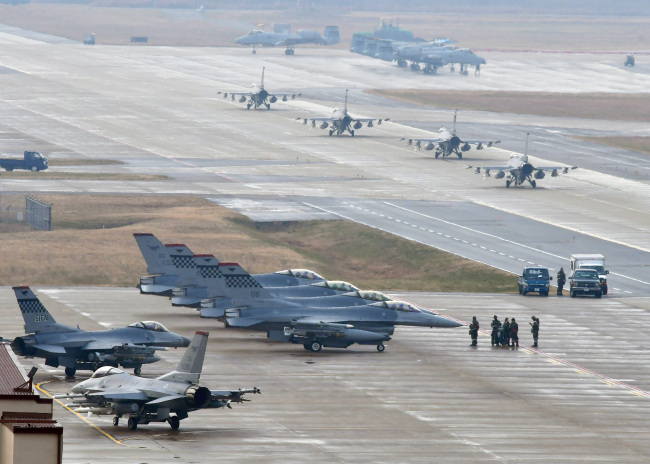As North Korea’s provocations push the US and its allies to take steps to increase pressure on the rogue state, China appears to be growing increasingly uneasy.
On Tuesday, the US and Japan Ground Self-Defense Force launched the annual bilateral command post exercise, on the heels of joint South Korea-US air force exercise Vigilant Ace that kicked off on Monday.

US military aircrafts taking part in the Vigilant Ace South Korea-US joint exercise are seen at the Osan Air Base in Gyeonggi Province on Tuesday. Yonhap
This year’s Vigilant Ace is being conducted on the largest scale to date, involving over 230 aircrafts including a number of F-22 stealth fighter jets.
While both exercises are conducted annually, Pyongyang, and Beijing to a lesser degree, are criticizing the move as fanning tension on the Korean Peninsula.
Chinese media outlets raised concerns that joint South Korea-US military exercises could escalate tension.
Citing military experts, China’s Global Times said that North Korea could be prompted into firing another missile, as the drills simulate attacks against North Korean nuclear facilities.
The view is an echo of North Korea’s claims that the Nov. 29 missile launch was a protest of drills between South Korea and the US, conveyed by Russian lawmaker Vitaly Pashin.
“This is the first missile launch since the last one carried out by North Korea on Sept.15. Since then, Pyongyang had refrained from military provocations for 75 days awaiting reciprocal steps from the US, which, instead of meeting [North Korea] halfway, announced large-scale surprise military drills,” Pashin was quoted as saying by Russian news agencies.
The Chinese government has also directly voiced concerns about the drills.
“The situation on the Korean Peninsula is highly sensitive. We hope all relevant parties take more actions that would help ease tensions and refrain from provoking each other,” Chinese Ministry of Foreign Affairs’ spokesperson Geng Shuang said in a media briefing on Monday.
Geng voiced a similar opinion on reports that the US could deploy missile defense systems on the country’s west coast in light of North Korea’s growing missile threat.
“On anti-missile system, China‘s position is very clear. Since the anti-missile issue concerns the global strategic security, stability and balance, we hope that all parties could approach this issue in a responsible and prudent way,” Geng said.
China’s revelation of its own air force drills is also thought to be a message to Seoul and Washington.
On Monday, China’s air force spokesman Shen Jinke told reporters that an air force drill was recently conducted in airspace over seas surrounding the Korean Peninsula, with aircrafts taking “routes and areas it has never flown before.”
According to Shen, the drills involved fighter jets, reconnaissance aircrafts, and surface-to-air missile units. He did not specify the time and the locations of the drills, but the timing of the announcement is thought to have been calculated to show China’s air capabilities, and to warn Seoul and Washington against pressuring North Korea further, according to Chinese media reports.
By Choi He-suk (
cheesuk@heraldcorp.com)






